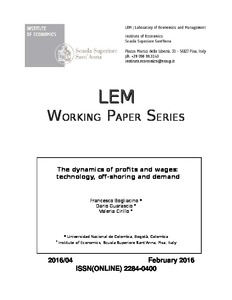The dynamics of profits and wages: technology, offshoring and demand

Institute of Economics. Scuola Superiore Sant'Anna. Laboratory of Economics and Management. ; Bogliacino, Francesco ; Guarascio, Dario ; Cirillo, Valeria
Scuola Superiore Sant'Anna - Pisa
2016
41 p.
innovation ; manufacturing industry ; profitability ; service sector ; outsourcing ; wages
France ; Germany ; Italy ; Spain ; United Kingdom
LEM Working Paper Series
2016/04
Technology
English
Bibliogr.
"This article explores the impact of innovation, offshoring and demand on profits and wage dynamics. The growing relevance of functional distribution in terms of explaining personal distribution underscores the importance of our results for understanding recent increases in inequality. The empirical analysis performed herein involves a panel of 38 manufacturing and service sectors over four time periods (1995 to 2010) across five European countries (Germany, France, Italy, Spain and United Kingdom). Our identification strategy relies on instrumental variables and recently proposed heteroskedasticity-based instruments (Lewbel, 2012). Additionally, we perform sensitivity analysis to account for omitted variables bias, following the recent theoretical results of Oster (2015). The main results of our study can be summed up in three points. First, it highlights the contrasting effects of R&D and offshoring as wage determinants: the former exerts a positive effect while the latter exert a negative effect. Second, it shows that external demand is a key variable driving profits growth. Third. it provides evidence of noteworthy results stemming from the categorization of workers according to skill level, such as: high-skilled workers are favored by both innovation and offshoring, offshoring exerts downward pressure primarily on low-skilled wages (not on mediumskilled wages as predicted by SBTC) and profits are positively correlated with high-skill wages, negatively correlated with medium-skill wages and not correlated with low-skill wages."
Digital
The ETUI is co-funded by the European Union. Views and opinions expressed are however those of the author(s) only and do not necessarily reflect those of the European Union or the ETUI.